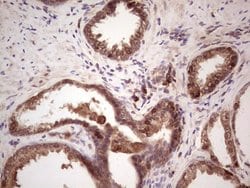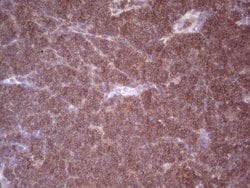Promotional price valid on web orders only. Your contract pricing may differ. Interested in signing up for a dedicated account number?
Learn More
Learn More
Angiopoietin 2 Monoclonal Antibody (OTI3H7), Invitrogen™
Mouse Monoclonal Antibody
Supplier: Thermo Scientific MA526781
Description
ANG-2 binds to the endothelial cell specific receptor Tie-2, but, in contrast to ANG-1, does not induce tyrosine phosphorylation. Consequently, ANG-2 modulates ANG-1 activation of Tie-2 and, depending on the physiological and biochemical environment, can act either as an agonist or antagonist of Tie-2 induced angiogenesis. The signaling interactions of ANG-1, ANG-2 and Tie-2, along with less characterized ANG-3 and ANG-4, are required for embryonic and adult angiogenesis. Physiologically, ANG-1 and ANG-2 are associated with sprouting, tube formation, and structural integrity of newly formed blood vessels. Mature human ANG-2 is a secreted protein containing 480 amino acid residues. ANG-2 is composed of an alpha-helix-rich coiled coil N-terminal domain and fibrinogen-like C-terminal domain. ANG-2 exists predominantly in the form of a disulfide-linked dimer.
Specifications
| Angiopoietin 2 | |
| Monoclonal | |
| 1 mg/mL | |
| PBS with 1% BSA, 50% glycerol and 0.02% sodium azide; pH 7.3 | |
| O15123 | |
| ANGPT2 | |
| Human recombinant protein fragment corresponding to amino acids 19-496 of ANGPT2 produced in E.coli | |
| 100μL | |
| Primary | |
| Human | |
| Antibody | |
| IgG1 |
| Immunohistochemistry (Paraffin), Western Blot | |
| OTI3H7 | |
| Unconjugated | |
| ANGPT2 | |
| AGPT2; Ang2; Ang-2; angiopoietin 2; angiopoietin-2; angiopoietin-2a; angiopoietin-2B; ANGPT2; endothelial growth factor; Tie2-ligand | |
| Mouse | |
| Affinity Chromatography | |
| RUO | |
| 285 | |
| -20° C, Avoid Freeze/Thaw Cycles | |
| Liquid |
Product Content Correction
Your input is important to us. Please complete this form to provide feedback related to the content on this product.
Product Title
Spot an opportunity for improvement?Share a Content Correction

